Blog
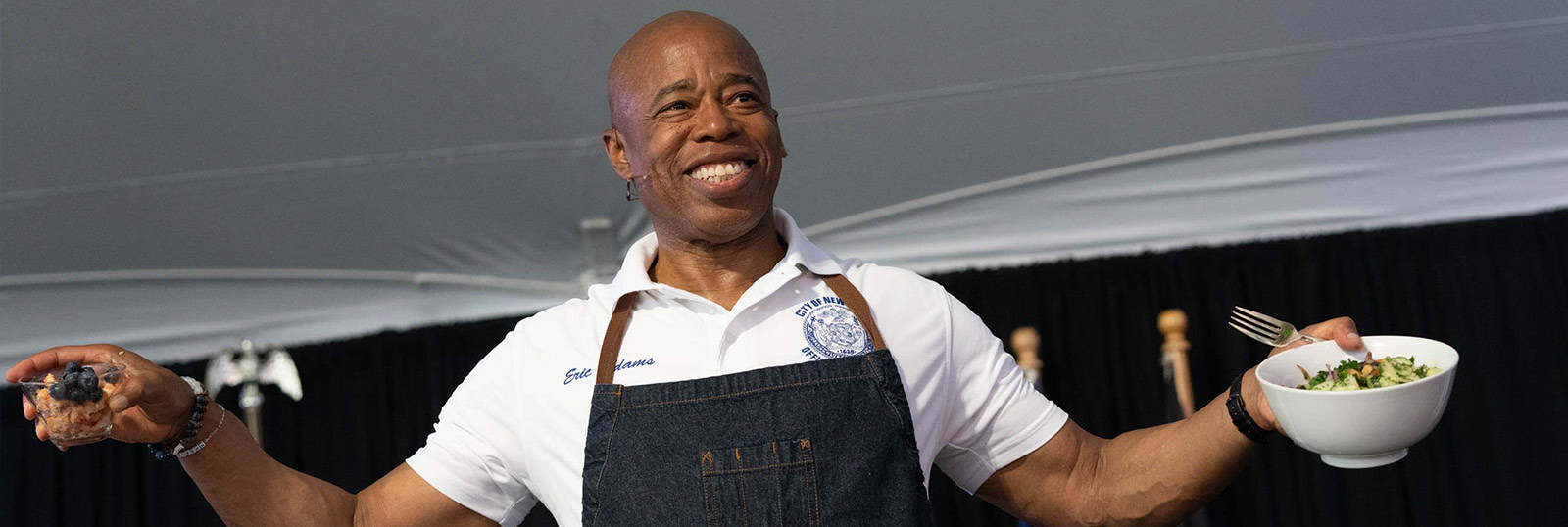
Mayor Adams of New York City demonstrating some delicious plant-based foods. (Photographer/Mayoral Photography Office)
“Addressing the impact of food consumption is a personal passion for me. I have talked about this for years. It’s in our food. Not only is our food harming our mothers and fathers, but it’s harming mother nature. And it’s time for us to be honest about this conversation and unafraid of where the facts take us.”
New York City is a world leader in implementing plant-based solutions to address the climate crisis and improve peoples’ health. It is introducing climate friendly food in schools, hospitals, jails, and community events throughout the city. Mayor Eric Adams, dubbed the ‘plant based mayor,’ was a strong advocate before being elected mayor, and has kept his commitment with a stream of major plant-based initiatives in New York City since he took office on January 1, 2022.
Eric Adams was born in Brooklyn on September 1, 1960 to a working class family. Six years ago, he was diagnosed with advanced type 2 diabetes. He started his journey by googling “reversing diabetes” and learned how a whole food, plant-based diet can reverse the disease. After shifting from a processed food diet, consisting of fast food and donuts, to a whole foods plant-based diet, he noticed remarkable results: “When I switched to a plant-based diet, I saw an immediate difference in my health. Within three months, I lost weight, lowered my cholesterol, restored my vision, and reversed my diabetes.”
“A plant-based diet restored my eyesight, put my Type 2 diabetes into remission, and helped save my life.”

‘Healthy At Last’, a book by Mayor Adams detailing his health journey (Photographer/Mayoral Photography Office)
In a 2020 interview with Forks Over Knives, Adams said, “In the past, my entire meal was built around my life, now my life is built around my meal” (FOK interview). He chops his carrots and other veggies for the week. “90% of what I eat is what I cook.” When he was ill, Adams visited five doctors in New York City and none of them suggested a plant-based diet to help reverse his health issues, instead they all looked to prescribe medication. It shouldn’t be this way; people should be aware of the powerful positive health benefits a whole foods plant-based diet can bring. Adams was inspired to write a book to help people take charge of their own health, Healthy At Last: A Plant Based Approach to Preventing and Reversing Diabetes and other Chronic Diseases (Hay House, 2020).
8 trailblazing NYC initiatives under Mayor Adams’ leadership that could be rolled out where you live too:
1. Eat a whole lot more plants
In mid May 2023, NYC launched a public Eat a whole lot more plants campaign through a variety of public advertising on radio, outdoor billboards and digital media. The campaign focuses on neighborhoods with health and socioeconomic inequities. Residents are encouraged to call the city if they have any questions about nutrition as they are urged to adopt a healthy whole foods diet with fruits, vegetables, whole grains, beans, and nuts. Eating a diet with lots of plants improves health and can help manage and reduce the risk of type 2 diabetes.
Mayor Adams stated that with the campaign his administration is ‘continuing the important work of transforming New Yorkers’ menus, improving their health, and building a more sustainable world,” He went on to acknowledge that “A plant-based lifestyle transformed my life, and helped put my type 2 diabetes into remission. By embracing the power of plants, and ensuring every neighborhood across our city has both the knowledge and the access to healthy foods, we can cultivate a healthier future, one plant-based meal at a time.”
2. Plant Powered Fridays

NYC’s Department of Education launched Meatless Mondays in all schools in 2019. At the beginning of February 2022, Mayor Eric Adams added Plant-Powered Fridays, requiring that the main entree served in all public schools each Friday to be vegan, benefiting the lives of close to one million children in the NYC public school system. The NYC website says a vegan option is available as the “primary” meal option on a Friday and “students may also select from non-plant-based meal options, and milk is always available.” Mayor Adams believes that the children of New York are ready for a plant-based future, commenting “A young girl stopped me the other day and stated, “Thank you for the Meatless Mondays and Plant-Powered Friday.”
Despite the mayor’s best efforts, Plant-Powered Fridays aren’t entirely vegan due to a federal requirement under the US Department of Agriculture guidelines, public schools are required to serve a carton of cow’s milk at all school meals. Prior to becoming mayor, Eric Adams tried unsuccessfully to push the city’s Department of Education to ban chocolate-flavored dairy milk. Adams said, “We should be encouraging them to drink more water.”
Example of Plant-Powered Meals:
- 3 Bean Chili
- Pasta Primavera
- Big City Bean Taco
- Black Bean and Plantain Power Bowl
- Mediterranean Chickpeas
- Zesty Chickpea Stew
Throughout the week, the menus also offer plant-based options like peanut butter and jelly sandwiches and a hummus pre-prepared meal.
3. Serving Plant-Based food at events
Plant-based foods are exclusively served at NYC’s cultural events hosted by the Mayor’s Office, including heritage events such as LGBTQ Pride, Juneteenth Celebration, Greek Heritage, Puerto Rican Heritage, Jewish Heritage, and Asian-Pacific American Heritage.

Just some of the delicious vegan food served at the Mayor’s holiday party. Photograpy/Patrick Kwan

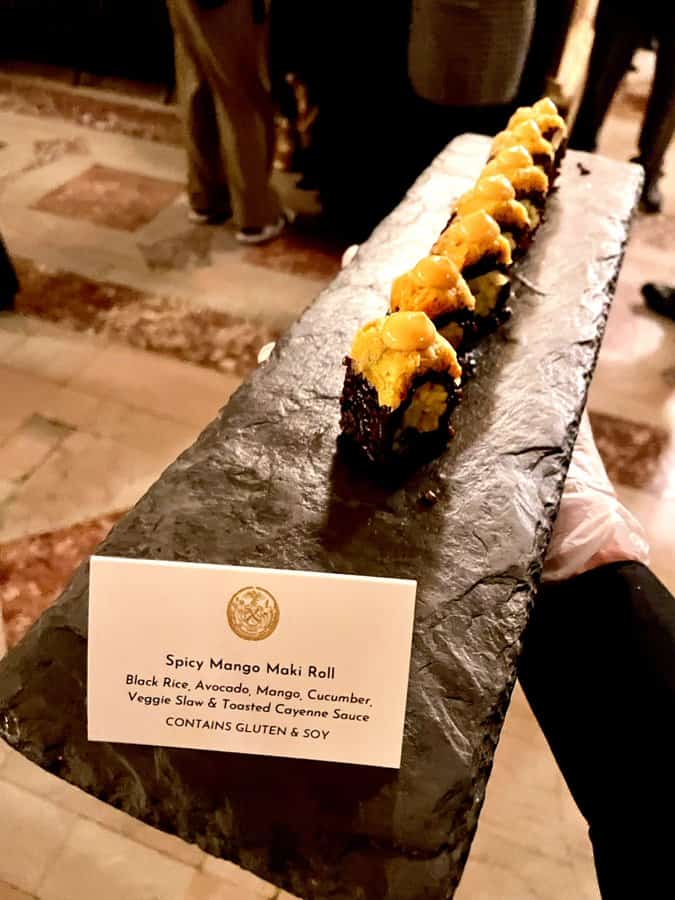
4. Consumption-based inventory for greenhouse gas emissions with C40 cities
Since 2019, 16 cities — including New York City, London, Paris, Tokyo, and Milan — committed to the C40 Good Food Cities Accelerator. Already, seven of these cities have collectively cut their meat purchases by 19% and increased their purchases of plant-based proteins by 44%.
For the first time in New York City’s history, the city is accurately measuring consumption based food emissions. On May 9, 2022, at a joint press conference with London Mayor Sadiq Khan, Mayor Eric Adams announced New York City will be signing onto C40’s Good Food Cities Declaration. One of the first projects is a collaboration in developing emission inventories for London and New York City.
“The new integrated emission inventory we’re unveiling today show that food is the third-biggest source of cities’ emissions right after buildings and transportation. Third, right after buildings and transportation. One in every five metric tons of carbon dioxide our city emits comes from food. But all food is not created equal. The vast majority of food that is contributing to our emission crises lies in meat and dairy products… That’s why today we are committed to reducing the city food emissions by 33 percent by 2030 and challenging our private sector partners to reduce by 25 percent by 2030. What this means is shifting the kinds of food we buy and serve. We’ve already started this work in our hospitals and our schools.” – Mayor Eric Adams
This new project to put the new inventory together is being underwritten by American Express’s Good Corporate Community Partnership and EcoDataLab. The C40 cities website notes that Mayor Adams and London’s Mayor Khan are both taking the lead on the development of consumption-based emissions inventories in New York City and London. According to the report, London’s food footprint: An analysis of material flows, consumption-based emissions, and levers for climate action: “Associated emissions are highly dependent on the type of food consumed. They are lower for plant-based products and higher for meat and dairy products…”
At the C40 cities World Summit, Mayor Adams announced that NYC has lowered the carbon emission of the food purchased as a city by 37 percent. This was achieved by the collective actions of Meatless Mondays and Plant-Powered Fridays in schools, and making plant forward meals the default in New York City Health + Hospital facilities.
Between 2019 and 2023, the city slashed its purchases of animal products by nearly 15%, with ruminant meats (predominantly beef) dropping by more than 60%. This reduction translated into a 29.2% decrease in our food-related emissions overall — or 43.7% less per 1,000 calories. Within the first year of the plant-based default program, H+H achieved a remarkable 36% reduction in their emissions.
5. Default plant-based in hospitals, 60% stick with the plant-based option
“From launching Plant-Powered Fridays in all public schools, to expanding Plant-Based Lifestyle Medicine Clinics in NYC Health + Hospitals facilities to all five boroughs, we are implementing transformative changes in the meals we serve and the food we source.” – NYC Mayor Eric Adams
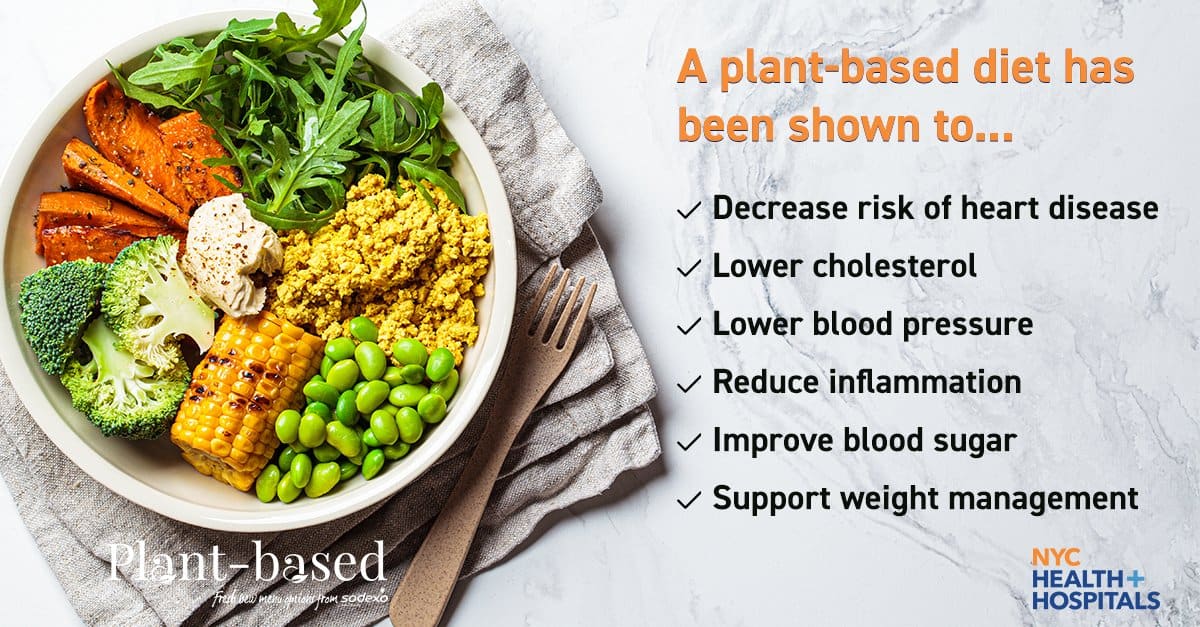
Photograpy/NYC Health
New York City Health and Hospitals, NYC’s public hospital system, has partnered with The Better Food Foundation and Greener by Default to make plant-based meals the default option for all inpatients in their network of 11 hospitals. Greener by Default provides behavioral strategies to “nudge” patients towards making sustainable, healthy food choices without restricting their options. All eligible patients are now offered two vegan Chef’s Special meals by default and can opt out of both if they want a meat based entree. The hospitals report that 60% of eligible patients are opting to stick with the plant-based options, which are delivering significant greenhouse gas emissions savings, as well as ensuring patients are eating healthier food.
Greener by Default partnered with NYC Health + Hospitals, Sodexo, and Mayor Adams’ Office to make plant-based meals the default for patient lunches and dinners. Watch the video to see how patients responded.
In a press release, Mayor Adams said, “We are proud to announce the successful rollout and expansion of default plant-based lunch and dinner options at all H+H sites. This transformative program is already changing lives, empowering patients to take control of their own health, and further cementing New York City as a leader in preventive medicine.” In a letter to the editor in the Washington Post, Kate MacKenzie, executive director of the New York City mayor’s Office of Food Policy, estimates, “The city anticipates serving 850,000 plant-based meals to hospital patients in 2023, with a projected food savings of $500,000.” The program did indeed lead to $500,000 in savings in the first year of implementation, a cost saving of 59 cents per meal.
6. Lifestyle medicine expansion to 6 of NYC’s public hospitals
“As a practicing clinician, I know that making lifestyle changes can do far more for my patients living with chronic illnesses than many medicines.”
– Dr. Ashwin Vasan, New York City Department of Health and Mental Hygiene Commissioner

(Photographer/Mayoral Photography Office)
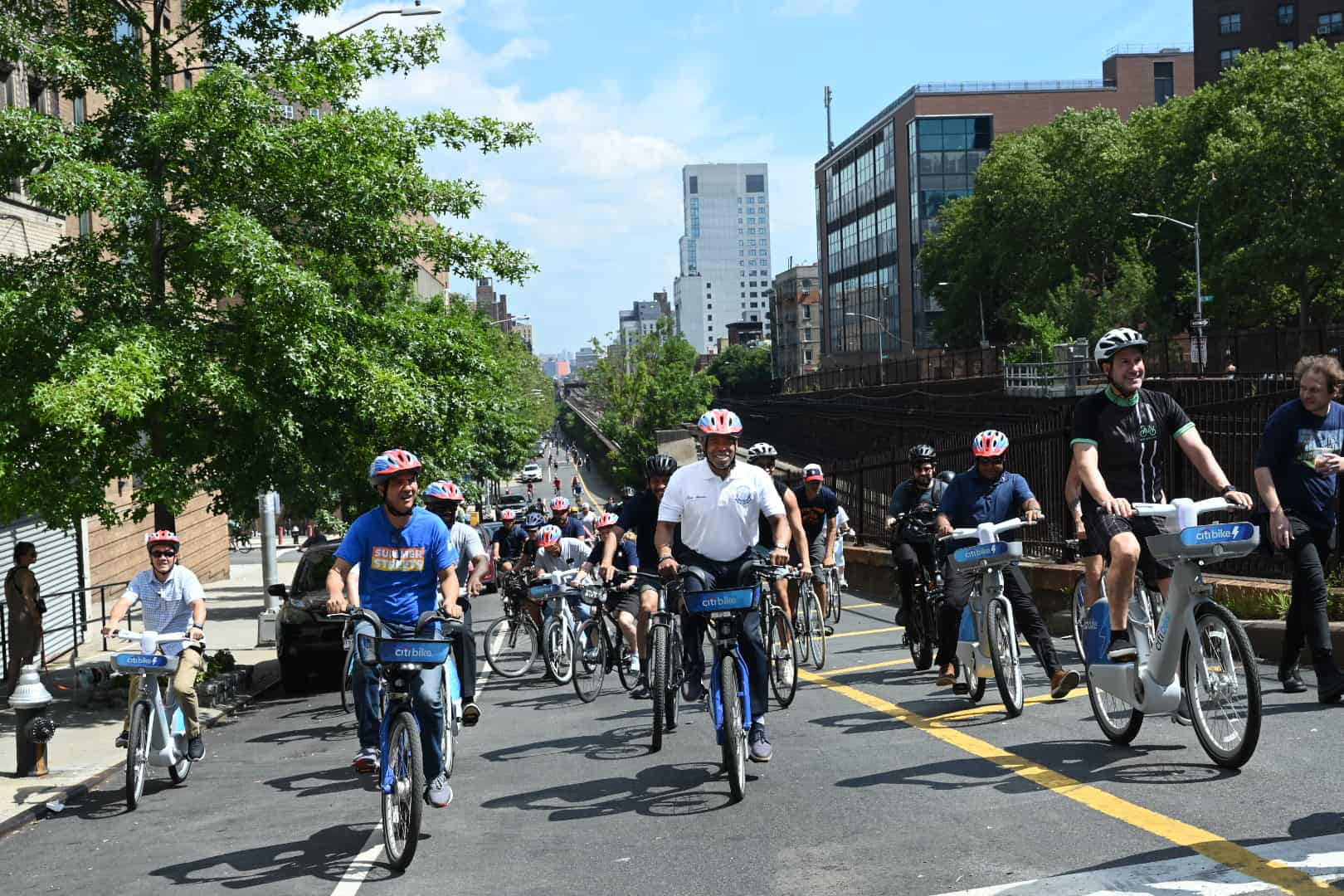
(Photographer/Mayoral Photography Office)
In February 2022, the lifestyle medicine program at hospitals was extended from one hospital to six public health care sites across New York City — the most comprehensive expansion of lifestyle medicine programming in the U.S, in an effort to make New Yorkers healthier.
NYC’s revolutionary model and plant-based food strategy needs to be rolled out across the world to replace the current standard model of pharmaceutical interventions. The problem of obesity and chronic disease is getting out of control and plant-based diets offer key solutions to fighting it. It is estimated that 29% of adults in New York City have hypertension and 12% have diabetes. Across the US, more than 100 million adults, almost half the adult population, have pre-diabetes or diabetes with 37 million Americans having diabetes. According to the American Heart Association, cardiovascular disease afflicts approximately 122 million Americans, and causes roughly 840,000 deaths each year. An article published in the Journal of the American Medical Association goes on to say that “overall diet quality is the single leading cause of premature death in the United States today, causing an estimated 500,000 deaths each year.”
7. Training for 200,000 NYC health care professionals
In addition, on December 5th 2022, the American College of Lifestyle Medicine (ACLM) announced a $44 million training program, the city’s 200,000 doctors, nurses and dietitians are now eligible for the world’s largest lifestyle medicine training program, which uses evidence-based, therapeutic lifestyle interventions to treat, and in some cases, achieve remission, in heart disease, Type 2 diabetes, hypertension, and obesity.
The much-needed training will help address structural issues in the lack of knowledge in lifestyle medicine. Only about 14% of physicians reported that they had the training to counsel their patients on nutrition. Only 27% of medical schools in the United States offer the requisite 25 hours of nutrition education in their programs.
The preventative medical training applies the six pillars of lifestyle medicine: a healthy plant-based diet, physical activity, stress reduction, sleep health, avoidance of risky substances, and positive social connections.
Mayor Eric Adams Makes Health-Related Announcement
The official press release describes the training: “5.5 hours of online, self-paced coursework, available for one year, and participants will be eligible for continuing education credits.” The rigorous online course includes plant-based trainings such as an Introduction to Lifestyle Medicine, Food as Medicine: Nutrition for Prevention and Longevity, and Nutrition for Treatment and Risk Reduction.. ACLM is sharing best practices in high-value care from other national health systems and inviting their participation in their Health Systems Council.
“We’re setting the standard for the rest of the nation, giving practitioners new tools to combat chronic disease and health disparities, and investing in a healthier city for generations to come,” – Mayor Adams.
“We are excited to now give back and invest in our health care professionals across the city to help fight health inequities in every community and to go upstream [which addresses root causes rather than symptoms] with our approach.” – Anne Williams-Isom, Deputy Mayor for Health and Human Services
Dr. Anne Williams-Isom draws the connection between the use of lifestyle medicine and efforts to address social barriers. This entails improving the health of individuals and poorer communities who often don’t have access to health care, yet often eat poor diets which results in greater demand for health care. If people were able to eat healthy whole food plant-based diets, then their dependency on health care would be greatly reduced.
8. Good Food Purchasing Program and other health-promoting policies
Good Food Purchasing Program
NYC joined the Good Food Purchasing Program in 2017 which has five core values: local economies, nutrition, valued workforce, environmental sustainability, and animal welfare. The core value guiding the nutrition program is: “Promote health and wellbeing by offering generous portions of vegetables, fruit, whole grains and minimally processed foods, while reducing salt, added sugars, saturated fats, and red meat consumption, and eliminating artificial additives.” The animal welfare program helps to: “Provide humane care for farm animals by improving overall wellbeing through better rearing practices and/or reducing total numbers raised.”

In February 2021, the office introduced the first ever NYC 10-year food policy plan, called Food Forward NYC. This plan outlines a comprehensive policy framework across all city agencies by expanding plant-powered options in all public schools; “reimagining DSS’s [Department of Social Services] food distribution program based on community feedback to include fresh produce for the first time in its history; and rolling out six new NYC Health + Hospital Plant-Based Lifestyle Medicine clinics.” In addition, the Mayor is signing executive orders: “We are driving systems change by signing executive orders that formalized the Good Food Purchasing program and required the promotion of healthy foods in City publications.”
“It’s time for all New Yorkers to have the opportunity to enjoy the benefits of a delicious, affordable, and plant-powered diet. We are making that happen!” -Mayor Eric Adams Food Forward NYC: A 10-Year Food Policy Plan

Groceries to Go
NYC did a pilot program of “Groceries to Go”, a subsidized grocery program, from December 2021 to December 2022. The updated program is designed as a Food Is Medicine intervention which aims to improve health outcomes, reduce food insecurity, and decrease long-term health care costs. NY Health Foundation proposed an amendment on January 13, 2023: “The proposed amendment will provide Health + Hospitals New York City Care members and eligible program enrollees who have a diagnosis of hypertension or diabetes and are at risk of food insecurity with access to healthier food through an online marketplace of local grocery stores. The Groceries to Go program is based on growing research that shows that the right kind of diet can help prevent and manage disease, while the wrong kinds of food can contribute to disease onset and worsen health conditions.”

Supplemental Nutrition Assistance Program (SNAP)
The incentive from Mayor Adams doesn’t stop there: “The city is matching money that New Yorkers spend on fruit and vegetables through the federal Supplemental Nutrition Assistance Program (SNAP), formerly known as food stamps. He also calls for more urban agriculture establishing the city’s first ever Office of Urban Agriculture, and including rooftop gardens and hydroponic systems.” NYC provides a map of farmers markets locations and offers incentives to low income people purchasing fruits and vegetables.
Check out NYC’s Nutrition Tips and Adopt a Shop Guide.
FRESH program
NYC’s FRESH program is offering financial incentives to neighborhood grocery stores designed to bring fresh grocery food closer to communities that often have limited access to fresh grocery food. A New York zoning resolution notes, in order to be a FRESH food store, 6000 plus squarefoot stores need to provide: 25% of floor area needs to be allocated for perishable items including dairy, fresh produce, frozen foods and fresh meats, with at least 500 square feet dedicated of retail space designated for selling fresh produce, which includes fruits & vegetables. Improving access to fresh foods in underserved communities is a crucial step in moving food systems healthier, more equitable and more sustainable.
Farmers Markets
On NYC’s website, under health topics, there is a Just Say Yes to Fruits and Vegetables Stellar Farmers Markets program. It provides free nutrition education workshops and cooking demonstrations at select farmers markets throughout NYC from July to November. The program builds participants’ knowledge and skills about how and why to prepare healthy meals using fresh, seasonal produce. Workshops are open to the public and are provided in multiple languages. All participants aged 18 years and older will receive a $2 Health Bucks coupon for attending and completing a survey.

(Photographer/Mayoral Photography Office)
Calling on NYC to endorse Plant Based Treaty 1.5
In 2022, Councilmember Shahana Hanif, District 39 of New York City, tweeted her support for the Plant Based Treaty.
Endorsing the Plant Based Treaty will help create bottom-up pressure for a global treaty to halt the expansion of animal agriculture and attributed deforestation, promote a shift to sustainable and healthy plant-based diets, and restore key ecosystems.
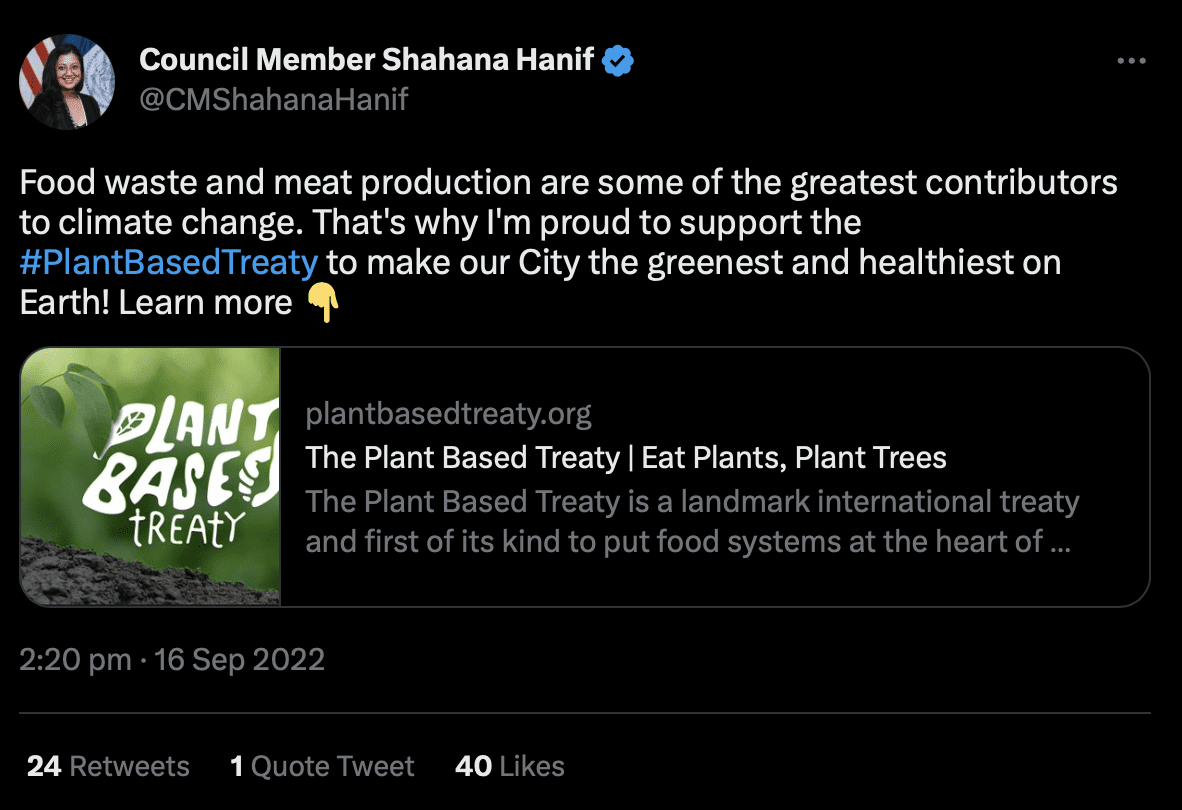
Plant Based Treaty has been upgraded to PBT 1.5 in 2023. City councils are invited to endorse the Plant Based Treaty initiative while also introducing meaningful commitments to address rising greenhouse gas emissions. New York City serves as inspiration to help other cities meet the commitments laid out in the Paris Agreement of limiting global temperature rises to 1.5C.
The PBT 1.5 campaign has developed a playbook and set of policy briefs for city councils, universities and colleges, schools, hospitals, prisons, retirement homes, community groups, restaurants, corporations, and other institutions. For example, NYC can also focus on retirement homes where there are over 1.2 million people in NYC over 65.
Cities have substantial influence over food emissions. Many cities and towns have jurisdiction over community education, food served in schools, hospitals, prisons and care facilities, as well as street festivals, and city catered events, meetings and functions. There are a number of tools at your disposal to move cities away from animal products and towards plant-based foods.
 Take Action
Take Action
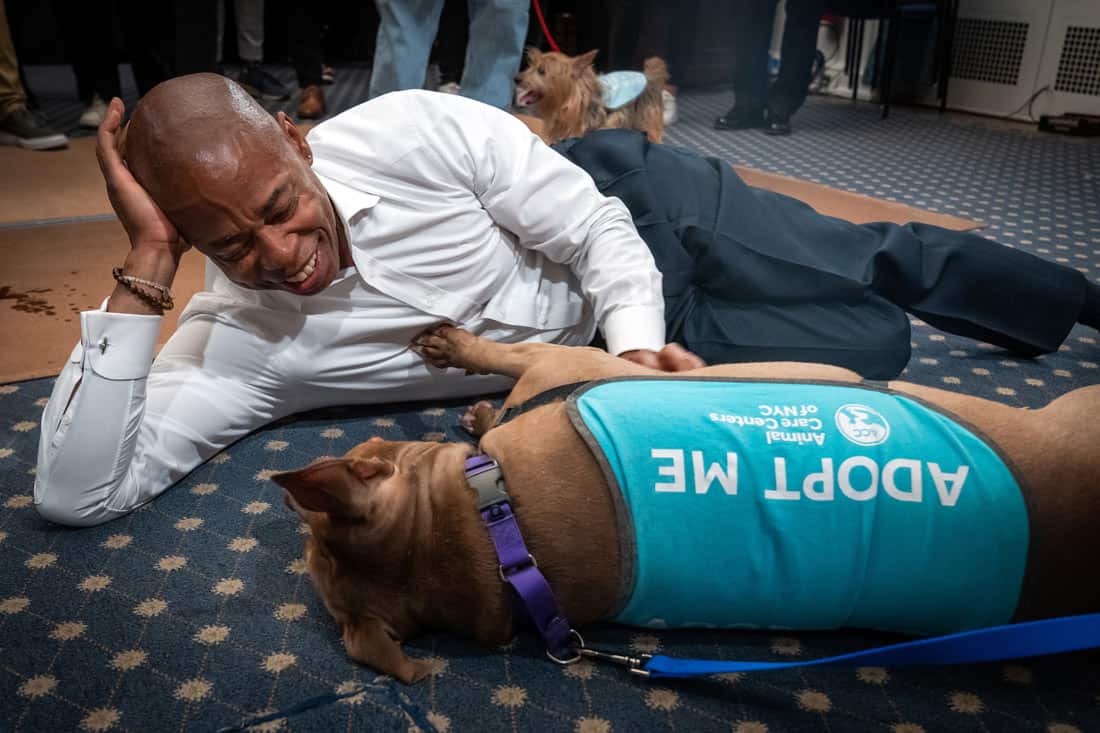
(Photographer/Mayoral Photography Office)
➜ Please share this blog
➜ Sign the petition asking NYC to endorse the Plant Based Treaty
➜ Email NYC City Council Members and ask them to endorse the Plant Based Treaty
➜ We need to replicate these amazing initiatives in New York City in cities across the world. You can help by filling out the PBT form on our website and joining one of our introductory, onboarding calls which take place every Friday at 10am and 2pm EST (Zoom Link)
➜ Join our PBT Slack account to communicate with our team
➜ Read or listen to Eric Adams book Healthy At Last: A Plant Based Approach to Preventing and Reversing Diabetes and other Chronic Diseases (Hay House, 2020).
➜ Listen to Mayor Adams interview on the Rich Roll Podcast
➜ Read the transcript of Mayor Adams speech to the C40 summit. “Not only is our food harming our mothers and fathers, but it’s harming mother nature.”
Social media assets:

Anita Krajnc is the co-founder of Toronto Pig Save and the Executive Director of the Animal Save Movement, a worldwide network of Save groups bearing witness to farmed animals and promoting veganism and love-based, grassroots activism. Anita helps coordinate global campaigns such as the Plant Based Treaty.

James O’Toole is a director of communications covering media relations, petitions, newsletters and celebrity activism. Previously James worked in the finance industry as a stockbroker and wrote market commentary.
More from the blog
6 Important Calls To Action From The Safe And Just Report – Part One
By Miriam Porter
Grow Your Own Kale And Spinach For Healthy Green Smoothies
By Miriam Porter
The Importance Of Exercise And Tips On Building Muscle
By Miriam Porter



